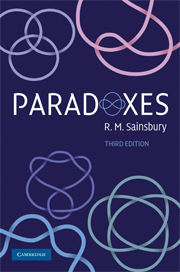Book contents
- Frontmatter
- Contents
- Foreword to third edition
- Introduction
- 1 Zeno's paradoxes: space, time, and motion
- 2 Moral paradoxes
- 3 Vagueness: the paradox of the heap
- 4 Acting rationally
- 5 Believing rationally
- 6 Classes and truth
- 7 Are any contradictions acceptable?
- Appendix I Some more paradoxes
- Appendix II Remarks on some text questions and appended paradoxes
- Bibliography
- Index
3 - Vagueness: the paradox of the heap
Published online by Cambridge University Press: 05 June 2012
- Frontmatter
- Contents
- Foreword to third edition
- Introduction
- 1 Zeno's paradoxes: space, time, and motion
- 2 Moral paradoxes
- 3 Vagueness: the paradox of the heap
- 4 Acting rationally
- 5 Believing rationally
- 6 Classes and truth
- 7 Are any contradictions acceptable?
- Appendix I Some more paradoxes
- Appendix II Remarks on some text questions and appended paradoxes
- Bibliography
- Index
Summary
Sorites paradoxes: preliminaries
Suppose two people differ in height by one-tenth of an inch (0.1″). We are inclined to believe that either both or neither are tall. If one is 6′ 6″ and the other is 0.1″ shorter than this, then both are tall. If one is 4′ 6″ and the other is 0.1″ taller, then neither is tall. This apparently obvious and uncontroversial supposition appears to lead to the paradoxical conclusion that everyone is tall. Consider a series of heights starting with 6′ 6″ and descending by steps of 0.1″. A person of 6′ 6″ is tall. By our supposition, so must be a person of 6′ 5.9″. However, if a person of this height is tall, so must a person one-tenth of an inch smaller; and so on, without limit, until we find ourselves forced to say, absurdly, that a 4′ 6″ person is tall (see question 3.1), indeed, that everyone is tall (see question 3.2).
How should one respond to the objection that someone 4′ 6″ tall may be tall for a pygmy?
How might one use similar reasoning on behalf of the conclusion that no one is tall?
In ancient times, a similar paradox was told in terms of a heap, and a Greek word for “heap” – soros – has given rise to the use of the word “sorites” for all paradoxes of this kind. Suppose you have a heap of sand.
- Type
- Chapter
- Information
- Paradoxes , pp. 40 - 68Publisher: Cambridge University PressPrint publication year: 2009



